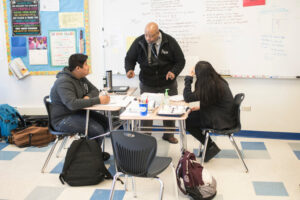How to help students break through academic roadblocks
May 20, 2019
We all get stuck sometimes. Whether it’s an academic rut, a challenge we can’t figure out, or external stresses, there are times when momentum can crawl to a halt. Roadblocks are a natural part of life; what’s key is to look at them as a natural part of the learning process. Just as growth and successes are part of the academic journey, so are challenges and mistakes.
At Saga, we encourage students to see roadblocks as not something to be feared, but as an opportunity for growth and evolution.
During training, Saga Fellows learn how to recognize when students are struggling as well as strategies to help them overcome those “roadblocks.” Here are a few of their insights:
Why do roadblocks happen?
“Many of my students believe that you must be born able to do math or that they must be able to do the math fast. My mission is to rid them of these and other misconceptions that get in the way of their success.” – Saga Fellow Claudy Chapman, Bogan High School, Chicago

It’s crucial to get beyond the myth of genetic math ability. We hear it all the time, “I am not a math person.” At Saga, we’ve had enough of this mindset. We believe that the idea of “math people” is one of the more self-destructive ideas. The truth is, there is no such thing as a “math person.” With hard work, preparation and practice, we can all get better.
“Some students hit roadblocks because they are afraid of making mistakes. I want to instill in all of my students that, not only is it perfectly okay to make mistakes but, in fact, it is from these mistakes that we are able to learn and grow. Thus, mistakes should be appreciated instead of feared. With enough time and effort, anyone can reach the highest levels of any academic area regardless of where they start out.”–Saga Fellow Tasnim Jackson, New York City
Many students are terrified of math equations because they lack confidence in themselves. We can show students that they have the capacity to bounce back from errors through thoughtful strategic coaching and real-time, personal feedback. Students will open up to this coaching through authentic relationships. Students must know that we genuinely care about their development and are interested in them as people.
How do you help students who are stuck?
“Students who aren’t confident in their skills are usually hesitant to participate. I take advantage of moments when they’ve solved something correctly to have them share their answers and explain their thought process. When they make a mistake, I praise the steps they’ve done correctly and have them explain how they got to their solution. I try to never tell them directly that something is incorrect, but instead, guide their attention to the error. This makes them less fearful of mistakes and more confident in speaking up when they’ve solved something correctly.” – Saga Fellow Tasnim Jackson, New York City
Rather than focus on whether answers are right or wrong, we encourage students to wonder, to reflect, to try something different–all of which lead to a path of understanding. Math isn’t just about performance. Math is about connections and communicating. Math is about creativity and making sense of concepts and ideas. To open the door to these conversations, questions are really important: Why does that answer make sense? Why does that method work? Can you prove it? How does this method connect to others? By encouraging students to illustrate their thinking we can shift their focus on learning vs memorizing algorithms and internalizing success and failure only through right or wrong answers.
“Never give up even if the student shows signs of giving up. Try to see yourself in the student in front of you to find that connection that will allow you to meet that student right where they are and move them forward.” – Saga Fellow Claudy Chapman, Chicago
Roadblocks are inevitable, but we must be relentless in our efforts to unlock student potential through patience in process and empathy in experience. Because the relationships students can count on are the ones that lift them up.
A service year with Saga is your chance to make a real difference. If you’re interested in becoming a Saga Fellow, learn more about the application process here.
